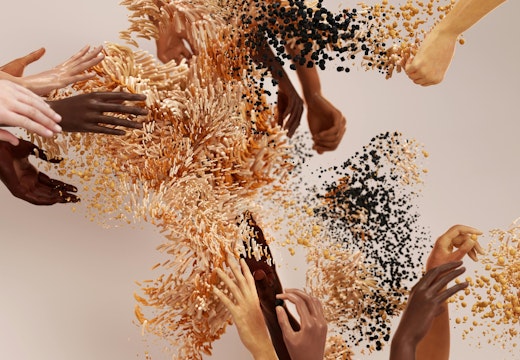Signal File: this week’s headlines explore design at the intersection of tradition and novelty
This week’s signals reveal how blending traditional practices with new technologies is shaping adaptive and sustainable design for the future of work
Staying ahead in the evolving world of work means tuning into the signals shaping where and how business happens. This week shows how adaptive, sustainable spaces emerge when traditional practices intersect with novel technologies – from AI-optimised bamboo and recycled-plastic furniture to participatory pavilions and workplaces reframed as tools.
Radius Pavilion gives users control over architecture
Michael Jantzen’s Radius Transformation Pavilion lets visitors reshape space through six movable steel segments powered by solar energy, shifting from enclosed shelter to open gathering area with a push. We’ve previously explored the theme of ‘Shapeshifter offices’ which explores the emergence of features such as mood-sensitive materials, neuroadaptive lighting and data-driven personalisation.
In action: Apply participatory design principles in the workplace with adaptive partitions, responsive furniture and systems that empower employees to influence their environment.
Cologne office positions workplace as a tool
A new 2,100-square-metre office in Cologne by Thomas van den Valentyn and Johannes van Linn reframes the workplace as a tool for competitive advantage. Beyond its neutral interiors and design classics, the building integrates wellness infrastructure – from a gym and sauna to IV health drips – treating employee wellbeing as part of business performance.
In action: View the workplace as a strategic tool, investing in environments that sustain performance, wellbeing and long-term value.
Students build AI-optimised bamboo cabin in China
Architecture students at Soochow University have completed the XBAMBOO Cabin – a six-square-metre teahouse and meditation space made from bamboo, timber and acrylic. The design blends traditional joinery with robotic fabrication, using GAN algorithms to optimise the timber frame and 3D scans to precisely connect irregular tree branches and bamboo poles.
In action: Explore hybrid approaches that combine AI optimisation, robotic precision and traditional craft to create sustainable and resilient spaces.
Torii Bench turns plastic waste into design value
Designer Aliasgar Aboojiwala has created the Torii Bench, made entirely from recycled plastic waste and inspired by the ceremonial form of Kyoto’s torii gates. Flat-pack shipping reduces carbon impact, while modular options – from simple seat to cushioned lounge – adapt to different settings.
In action: Circular design is moving beyond utility. Start treating waste streams as design assets, turning circularity into a visible and tactile expression of your values.








